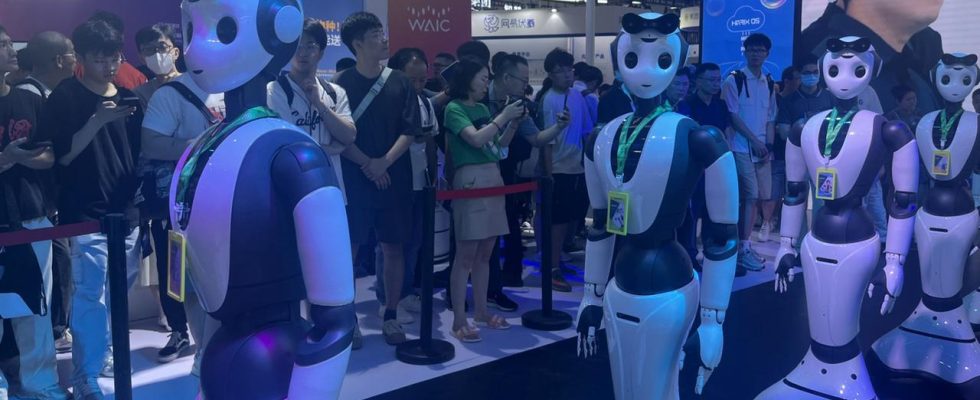background
Chinese tech companies are also positioning themselves for the rapidly growing billion-euro business in artificial intelligence. How far along are they? And where are your limits so far?
A group of human-sized robots, straight out of a science fiction film, dance to traditional Chinese music. This is one of the eye-catchers at the World Conference on Artificial Intelligence (AI) last week in Shanghai. It’s a technological revolution, at least that’s what the commercial promises.
The US company OpenAI, which started the AI revolution with its text robot ChatGPT, is not even involved. But other large tech companies, mainly from the USA and China: Google, Apple, Microsoft, Huawei, Baidu and Tencent. The space company SpaceX and Tesla boss Elon Musk, who was recently in China, was also live at the opening of the conference.
Language models “not so mature”
Jivka Ovtcharova, head of the Institute for Information Management in Engineering in Karlsruhe, came from Germany. How far is China with the big language models like ChatGPT, where you type a question in a chat and a machine answers it in a complex way?
“We are not so enthusiastic about the so-called Chinese type of ChatGPT. The language models are not that advanced, they are not that mature,” says Ovtcharova. “What really made a very good impression was more the autonomous driving.” There has already been a fairly large development here in China.
Overall, she had the impression that there was a lot of talk about the topic. “But I haven’t seen anything really unique, special or a very typically Chinese product.”
A lot of computing power is required
Chinese chatbots that work similarly to ChatGPT could be seen at the conference: for example from the large Chinese tech companies Baidu and Alibaba. But experts like Cai Hengjin, a Chinese professor of artificial intelligence at the University of Wuhan, see room for improvement in the language models of Chinese companies compared to the most modern language model to date, GPT 4.0.
“As far as I know, there are dozens of companies working on large language models in China, but very few that can reach the 3.5 level. Not to mention the 4.0 level,” the expert said. “The vast majority of models are estimated to be unable to reach this level.”
Cai Hengjin sees China in third place behind the USA and Great Britain in the development of artificial intelligence; the latter because Google Deepmind is based in London. Other experts put China in second place. “The gap is still very large, unless we change our strategy and no longer follow foreign technology,” he says.
The expert is convinced that if Chinese companies succeed in inventing a type of artificial intelligence that does not require as much computing power as ChatGPT, for example, they could catch up.
Limited access to cloud services?
China is currently affected by international computer chip restrictions. The US and other countries such as the Netherlands and Japan have imposed export restrictions on certain microchips and machines that can make chips. They want to prevent China from using artificial intelligence in the military.
However, Antonia Hmaidi from the China research institute Merics believes that Chinese companies can also find alternatives – without using such powerful chips. You just need more of it, more electricity, more resources. In addition, companies could rent computing power on the Internet. “It’s expensive, but you can do it,” says Hmaidi. But the US government is apparently preparing to restrict Chinese companies’ access to these so-called cloud computing services. This was recently reported by the “Wall Street Journal”.
However, the United States is not a pioneer in all areas, says Hmaidi. China is better at facial recognition, for example, and special industrial applications – and at social media algorithms. “Of course, from what we know, the TikTok algorithm is among the best out there.”
Communist party wants to stay in control
There is also a discussion about artificial intelligence – the opportunities, risks and dangers – in China. In addition, China – similar to the EU recently – has presented a draft for state regulation: artificial intelligence should be safe, understandable and not contribute to social destabilization.
But behind the latter there is also a political self-interest of the Communist Party in the autocratically governed one-party state, says Hmaidi. It is also about the party keeping control that “no information with which the party does not agree is shared”.
The Internet has already brought the People’s Republic under control with strict censorship. She’s also trying artificial intelligence. Chat GPT by OpenAI is not available in China.

